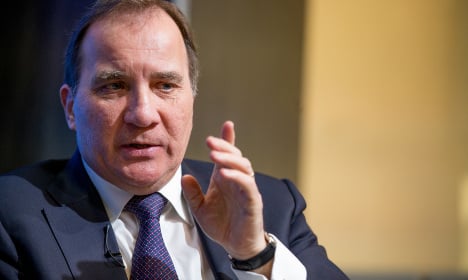Only a few of the 40-50 promises in the Social Democrat election manifesto have so far been pushed through, such as recognizing Palestine, and appointing an innovation committee and an energy commission.
However, other plans have run to a grinding halt, the most prominent of which was when the government's first budget was voted down by parliament in December. Youth trainee jobs, raising unemployment benefits, and lowering taxes for pensioners are other proposals that have also not been implemented during the government's first six months in office.
This is a new situation for Löfven's Social Democrat Party, which had long enjoyed a strong position in Swedish politics before voters booted it in the 2006 election in favour of Fredrik Reinfeldt's right-wing coalition.
“The Social Democrats are quite used to successfully implementing the points in their election manifesto, but things are likely to look rather different going forward,” political scientist Elin Naurin told Swedish news wire TT.
Unlike previous Social Democratic governments, the party is now leading Sweden in a coalition with the Green Party. The minority government has found itself forced to negotiate with the Left Party to gain support on budget issues, which requires compromises.
A centre-left strategy to divide and rule among the opposition, hoping that the four parties in the right-wing alliance would go their separate ways after September's general election, has also failed to come to pass.
“In this way, Stefan Löfven finds himself in a completely different position to that of previous Social Democratic governments. It will be interesting to see how they manage the educational task of explaining this, both to the voters and to their own people,” said Naurin.
But the government has not been resting on its laurels. Löfven, who is hoping to get Sweden a seat on the UN Security Council, has clocked up a fair amount of air miles with an average of one trip abroad a week. Committees have been appointed and ministers have invited experts and industry professionals to pitch in on everything from the recent Saudi Arabia crisis to the problems of dairy farmers.
The government will get a new chance to perform in mid-April, when the spring budget is set to be presented. The right-wing alliance vowed in the so-called December Agreement when last year's budget crisis was resolved, to allow the government to get future budgets through parliament. And the government is now in a hurry to bring as much of that which was thwarted last year back on to the agenda.
Löfven has highlighted his plans for a '90-day guarantee' for unemployed youths to get a foot on the jobs ladder as one of the most important proposals. 32,000 trainee jobs were promised during the election campaign, but it is unclear how quickly local authorities will deliver.
Another one of the big promises is the government's vow to abolish 'Phase 3' ('Fas 3'), part of the jobs and development guarantee policy which the former centre-right Alliance government introduced in 2007, for 36,000 long-term unemployed. But in the government's budget, which was voted down last year, funds had been allocated to create no more than 4,400 jobs to replace Phase 3.
“We will put all our efforts into working on this. It's not the resources that are going to be a problem, it's finding work duties for these people,” TT quoted Finance Minister Magdalena Andersson as saying.
In search for funds to carry out reforms, Löfven has broken two of his other election pledges – the promise not to raise fuel tax and the vow not to touch the tax deduction for home renovations (ROT). Both are set to be executed in 2016 to increase tax revenue.




 Please whitelist us to continue reading.
Please whitelist us to continue reading.
Member comments